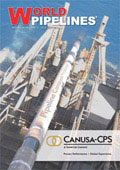Editorial comment
The legendary US oil investor T. Boone Pickens, speaking recently in Calgary about the demand for an Alaskan pipeline to deliver gas to the lower 48 states, speculated that abundant new discoveries of domestic shale gas would trump the need for an Alaskan gas line.
Register for free »
Get started now for absolutely FREE, no credit card required.
The legendary US oil investor T. Boone Pickens, speaking recently in Calgary about the demand for an Alaskan pipeline to deliver gas to the lower 48 states, speculated that abundant new discoveries of domestic shale gas would trump the need for an Alaskan gas line. Promoting a plan to boost investment in US natural gas and to cut oil imports, Pickens questioned whether an Alaskan pipeline makes sense.
He argued that proven gas on the Arctic coast (39 trillion ft3) couldn’t beat the estimated 50 trillion ft3 of gas in the Barnett Shale alone, not even counting the new plays popping up all over the country. “I don’t think a pipeline gets built right now…I don’t think the pipeline will be built for 10 to 15 years”, said Pickens.
Pickens’ comments come in the same week as The Colorado School of Mines’ Potential Gas Committee (PGC) releases its biennial report, which concludes that the amount of natural gas available for production in the US has increased by 58% in the past four years. According to the research, the US has at its disposal over 2000 trillion ft3 of natural gas in the ground, a much higher estimate than that given in previous studies and 100 years’ supply at current production levels.
Barnett Shale production, along with new discoveries in Louisiana, Pennsylvania, Arkansas and British Columbia, has sparked a drilling boom for domestic gas. It is significant that, despite the current increased costs for exploration and production, US gas reserves managed to grow last year.
A recent report found that the cost of finding US oil and natural gas soared in 2008, rising by 35% on average.1 Oil companies, required by regulatory reporting rules to book only the gas reserves that can be produced economically at the closing price on the last day of trading of the year, had to make some write-downs in order to weather the economic storm. Despite reductions of some 6.7 trillion ft3 across the industry, gas reserves still rose by 4% in 2008. At present, US natural gas storage levels are nearing 22% higher than the five year average and the gas prices are hovering at US$ 4/MMBtu, down from US$ 13/MMBtu last year.
In contrast, increasing oil prices have been a key issue this week in Washington, as the Senate voted in favour of an energy bill that would open up new areas to offshore drilling; and next week sees the House of Representatives vote on a climate change bill to introduce cap emissions of gases that are said to contribute to climate change. The natural gas industry, which posits itself as the environmentally friendly alternative to other carbon based fuels such as coal and oil, appears to have the upper hand: shale fields account for approximately a third of US gas resources and have the capacity to provide more. “Natural gas is right now. The resource is here. The ability to develop it is here,” says Chris McGill, Managing Director of policy analysis for the American Gas Association.
According to the EIA’s short-term energy outlook, the monthly average Henry Hub natural gas spot price is expected to stay under US$ 4/MMBtu until late in the year, as abundant natural gas supplies converge with weak demand driven by an 8% decline in industrial sector consumption. The price is projected to increase from an average of US$ 4.13/MMBtu in 2009 to an average US$ 5.49/MMBtu in 2010 as expected economic growth boosts industrial consumption of natural gas. Pipeline projects of note are Rockies Express, Vector pipeline and other northeast interstate pipelines.
Shale and other unconventional resource development is expected to drive pipeline expansions for the foreseeable future, but not all pipeline proposals will lead to actual infrastructure - the current economic downturn will have an impact on production and pipelines, but will it preclude an Alaska line? Is there simply too much gas to make an Alaska pipeline project float, at least for the next few years?


